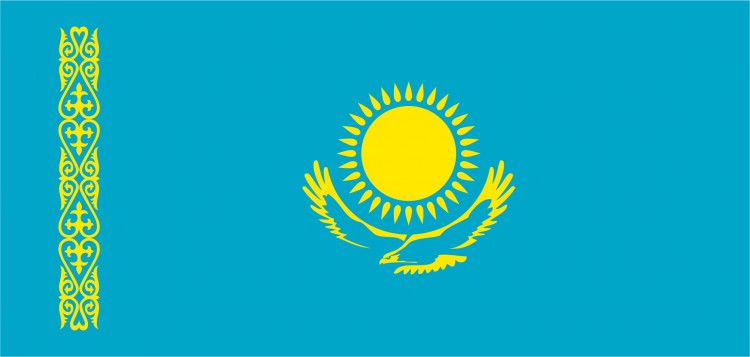National Flag of Kazakhstan
The Flag is one of the main symbols of the state that represents its sovereignty and identity. The Russian term “flag” for Flag comes from the Dutch word “Vlag” and means cloth of officially adopted size and colour and commonly with an image of emblem (coat of arms).
The Flag of sovereign Kazakhstan was officially adopted in 1992. It was designed by Shaken Niyazbekov.
The State Flag of the Republic of Kazakhstan is a rectangular breadth of blue colour with the image of the sun in its center with a soaring steppe eagle underneath. Along the flagstaff there is a vertical band with the national ornamental patterns. The images of the sun, rays, eagle and ornament are of golden colour. The ratio of the Flag’s width to its length: 1:2.
In heraldry each colour has its own specific meaning. Thus, a blue-sky colour symbolizes honesty, fidelity and integrity. Moreover, the blue-sky colour has a deep symbolic meaning in Turkic culture. The ancient Turkic peoples always worship the Sky as their God, and their blue-sky banner symbolized devotion to Father Ancestor. The blue colour of the State Flag of Kazakhstan means pure sky, peace and prosperity, and self-colour of the background represents the unity of our country.
According to the heraldic principles the sun symbolizes wealth and abundance, life and energy. That is why the sun rays on the flag have the form of grain, a symbol of wealth and welfare. By representing the sun at its state attributes Kazakhstan reaffirms its commitment to universal values, which also indicates that the new young country is full of life-affirming energy and is open to all countries for cooperation.
The image of the steppe eagle is one of the main heraldic attributes which is used on coat of arms and flags of various peoples for centuries. This image is commonly considered as a symbol of power, insight and generosity. A soaring steppe eagle represents by itself a power of the state, its sovereignty and independence, aspiration to high goals and sustainable future. The image of the steppe eagle on the world outlook of Eurasian nomads has a special place and is associated with such notions as freedom and fidelity, sense of dignity and courage, strength and purity of thoughts. The symbolically rendered silhouette of the golden steppe eagle reflects aspiration of the young sovereign state to the heights of world civilization.
Another important element of the State Flag is a vertical band with the national ornamental patterns. This Kazakh ornament is one of the forms of specific artistic perception of world in strict accordance with aesthetic styles of the people. Representing a harmony of various forms and lines, it is also an expressive means of discovery of the inner world of the people. The national ornament along the flagstaff represents the art and cultural traditions of the people of Kazakhstan.




